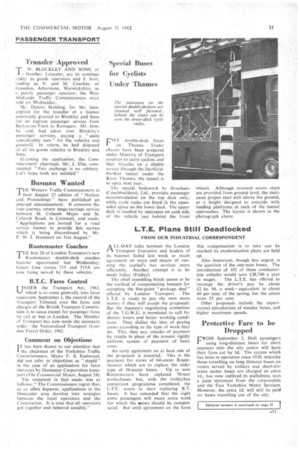L.T.E. Plans Still Deadlocked
Page 13

If you've noticed an error in this article please click here to report it so we can fix it.
FROM OUR INDUSTRIAL CORRESPONDENT
ALL-DAY talks between the London Transport Executive and leaders of its busmen failed last week to reach agreement on ways and means of running the capital's bus services more efficiently. Another attempt is to be made today (Friday).
The chief stumbling block seems to be the method of compensating busmen for accepting the five-point "package deal" offered by London Transport. The L.T.E. is ready to pay the men more money if they will accept the proposals. But the busmen's negotiating committee of the T.G.W.U. ismandated to call for shorter hours and better working conditions. They dislike the idea of paying crews according to the type of work they do. This, they say, smacks of payment by results in place of the present rigidly uniform system of payment of basic rates.
An early agreement on at least one of the proposals is essential. This is the payment for crews of 64-seater Routemasters which are to replace the older type of 56-seater buses.. Up to now Routemasters have replaced 70-seat trolleybuses, but, with the trolleybus conversion programme. completed, the L.T.E. wants to start replacing R.T. buses. It has conceded that the eight extra passengers will mean extra work for which the worms should be compensated. But until agreement on the form this compensation is to take can be reached its modernization plans are held up.
Also important, though less urgent, is the question of the one-man buses. The introduction of 102 of these conductorless vehicles would save £38,740 a year in wages. The L.T.E. has offered to increase the driver's pay by about £2 6s. 9d. a week—equivalent to about 40 per cent. of the saving, but the union want 55 per cent.
Other proposals include the experimental introduction of standee buses, and higher maximum speeds.




























































































